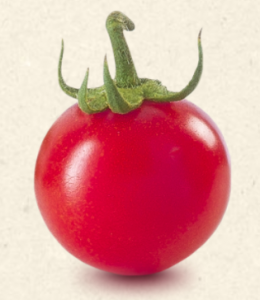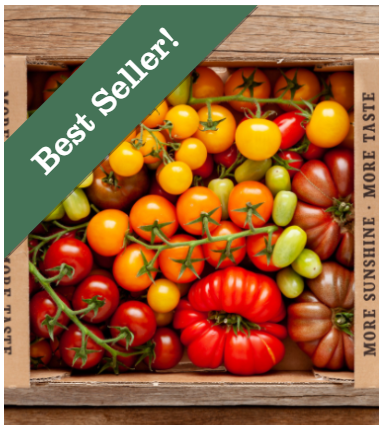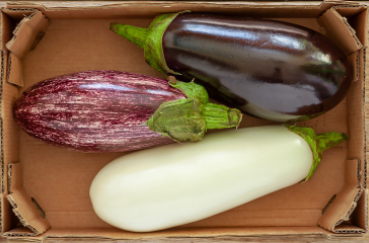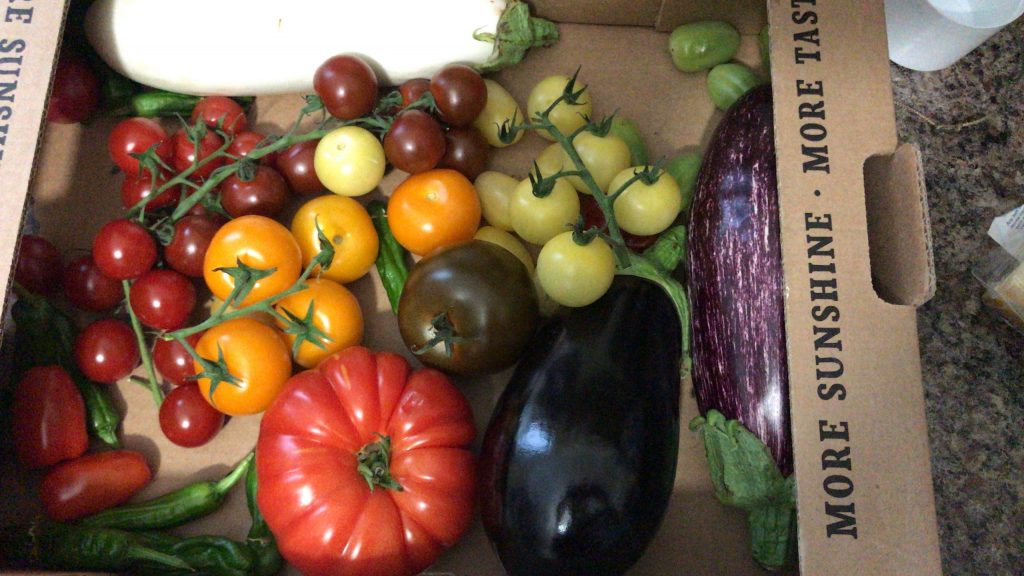The Isle of Wight has become famous for an abundance of fresh produce over the years, perhaps thanks to the warmer climate, business opportunities or the rolling countryside and seas. Even if you don’t live on the Island and you have not yet been, it is likely you will have tried or at least seen The Tomato Stall tomatoes.
Back in 2007 MD Paul Thomas and co-founder Jeff Macdonald (now of IW Mushrooms) made the bold move to take their freshly picked tomatoes to the London markets. The markets were, at the time, relatively new to London and the stall holders were amazed with the quality of the fruit so the business started to grow along with the awareness of The Tomato Stall brand.
Now The Tomato Stall produce can be found all over the country in independent retail, farmers’ markets and chef’s kitchens alike, a remarkable achievement from a nursery in Arreton. It sounds small when you call it a nursery but the Arreton tomato farm is home to around 60 acres of glasshouse and grow up to 200 different varieties. A mind-boggling number of varieties which makes them unique in the industry. I have certainly not seen the quality rivalled and it seems to be a clear success story which is incredibly inspiring and another reason to be proud of the IOW. The range of products has also grown with the business and now includes sauces and condiments, juices and even crisps! Fresh produce includes Padron peppers, Sweet Bite Peppers and the most amazing aubergines in white, and purples. The tomatoes come in all kinds of colours and sizes, with over 40 varieties grown each year. The quality and depth of flavour is nothing like the usual tomatoes found in the supermarkets or even the more expensive, organic grown on the vine varieties. I have tasted only a few organic fresh tomatoes that come close to the quality of The Tomato Stall and they were picked straight from the vine in a polytunnel. To still taste so fresh and strong days later is testament to the development and hard work that has gone into the production at The Tomato Stall.
The entire growing system is biodegradable including the coconut husk that the tomatoes are grown in and the string that supports the plants. Any plant waste is composted on site which is then used to fertilise the soil for the next year’s crop. The Tomato Stall use natural predators to control pests, and the pollination of all the plants is done by a team of bumblebees that are native to the UK. They also carry the LEAF mark which works with farms to ensure that food is grown sustainably with care for the environment. The team appear as sustainable as the nursery with the two head growers boasting a wealth of expertise and experience equating to over 50 years between them.
I caught up with the team and asked them some questions about tomatoes
What is your favourite type of tomato and why?
Choosing only one is tough and our range is full of choice! Over the years there are some varieties that have always been requested for their exceptional flavour so would say our Piccolo cherry vine tomatoes. Notoriously hard to grow but unbeatable on flavour. We’ve tried for years to find an alternative and it never matches the perfect balance of acidity and sweetness of the piccolo.

What is your favourite dish to cook using tomatoes?
That’s really difficult, it really depends on the time of year. Right now, we are loving our heritage tomatoes with fresh burrata and asparagus. Perfectly seasonal, high quality ingredients that need little help to make them sing on the plate.
What has been your biggest challenge at The Tomato Stall?
Covid-19 certainly presented some challenges. A significant part of our business serviced eateries up and down the country however, we were able to turn a negative into positive and transform our online home delivery service by activating a subscription service that allowed our customers to get farm fresh produce straight to their door. The reaction was incredible, and we have created new jobs based on this opportunity.
What are some great things about running an island business? What are the difficulties you face?
There are always logistical challenges when being based on an Island. A large portion of our customer base is on the South Coast and London. That stretch of water means we need to be business smart and plan ahead. However, because we are Island based, we have various mindful business practices such as a closed loop system that means that we ensure every natural resource is utilised and waste managed effectively. Rainwater for example is a precious resource that we harvest from the glasshouse roofs and store in reservoirs, totalling 100million litres of water. This water is then used in to irrigate the crops. We also recirculate the drain water from the irrigation, sterilise it and reuse it so nothing is wasted.
In addition, we have a unique compost facility on site that has been specifically designed to process all the natural waste generated daily throughout the nursery. Over the course of 9 months, this becomes the fertiliser that enhances our organic soils. Operating a closed loop system and reducing waste is born out of the fact that we are Island based and must be mindful of our impact as a grower.
How has demand changed with consumers?
We have always delivered nationwide to a range of stockists and farmers’ markets. However, given the growing need to be able to get food to people’s doorsteps over the last year, we have activated our Box Scheme which means wherever you are, we can send a box of freshly picked Isle of Wight tomatoes as often as you like! Three noticeable changes would be a need for convenience, a desire to understand more about the process and an appetite for the unusual. Long gone are the days when a red and yellow pack of tomatoes is seen as exotic. Consumers want to be excited by produce and understand where it comes from.


If you weren’t running The Tomato Stall what would you be doing?
Travelling the world and eating as much food as possible. I’ve always taken inspiration from global cuisine. I still believe there is more we can do to elevate this traditional fruit.
What’s next for The Tomato Stall?
Our mission has always been to inspire people to use tomatoes in as many ways as possible. Hence why we’ve been partnering with like-minding producers in the UK to create unique recipe kits which our customers have loved. Plus, this year we have experimented with diversifying into other crops such as aubergines and peppers which are really complimentary to tomatoes. We also have a few more product launches up our sleeve this year so keep your eyes peeled.

The team kindly sent me a beautiful box of samples for my recipe.
I decided to make something a bit more refined looking this time but it is very simple so don’t be put off trying this recipe .
EAT STREET RECIPE
Tomato and charred aubergine bruschetta with whipped feta and fresh pesto

Bruschetta
1 loaf Fresh crusty sourdough bread, medium sliced
20ml Cold pressed rapeseed oil (Oil of Wight)
5g tomato sea salt (Tomato Stall)
1 clove garlic
- Drizzle the bread slices with the oil.
- Squash the garlic clove with the edge of a knife to release the flavour and rub it onto the bread. Sprinkle with sea salt
- Bake on a silicone mat in a hot oven (200C) until golden
Pesto
1 large handful fresh basil
50g pine nuts or cashews
Squeeze lemon juice
50g parmesan, grated (use an alternative for a vegetarian version)
Rapeseed oil or olive oil 50ml approx.
Salt to taste
- Blend all ingredients in a blender, adding the oil cautiously until a dropping consistency is achieved. Don’t over season.

Charred aubergine
1 Tomato Stall aubergine of your choice
30ml Oil of Wight
Small bunch fresh thyme, picked
Salt to taste
Slice the aubergine lengthways thinly
Place the aubergine slices onto a very hot char grill pan for a couple of minutes each side or until you have clear char lines
Lay the aubergine onto a silicone mat and drizzle with the oil. Sprinkle with the thyme leaves and season
Roast for around 8 minutes at 190C until just cooked, soft but not mushy
Roll the slices into roulades and set aside at room temperature.
Tomatoes
500g mixed tomatoes
10g caster sugar
5g sea salt flakes
20g Oil of Wight
Slice the small tomatoes in half and place skin side down on a silicone mat. Cut the larger tomatoes into quarters and do the same
Sprinkle the tomatoes with the sugar, salt and oil and preheat the oven to 150C
Place the tray into the oven and then close the door and turn the oven off. Leave to cool completely. The tomatoes will soften and the salt and sugar will enhance the flavour without cooking them too much. The tomatoes are so amazing you won’t want to over process them.

Whipped feta
200g feta
50g cream cheese
Squeeze lemon juice
Pinch ground black Pepper
Blend the feta in a food processor until it is a fine crumb. Add the remaining ingredients and blend further. You will not need to add any salt.